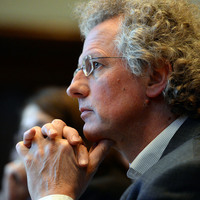- Berlin, Land Berlin, Germany
http://www.os.tu-berlin.de/v_menue/mitarbeiter/prof_arnold_windeler/ - #49-30-79824
Arnold Windeler
Technische Universität Berlin, Department of Sociology, Faculty Member
In diesem Aufsatz formuliere ich einen Theorierahmen für die Erklärung der soziale Konstitution von Können und Kompetenz von Individuen, Organisationen und Netzwerken, der soziale Praktiken in den Mittelpunkt der Analyse rückt und auf... more
In diesem Aufsatz formuliere ich einen Theorierahmen für die Erklärung der soziale Konstitution von Können und Kompetenz von Individuen, Organisationen und Netzwerken, der soziale Praktiken in den Mittelpunkt der Analyse rückt und auf Arbeiten des englischen Soziologen Anthony Giddens (1984) aufbaut. Die Ausarbeitung eines solchen Theorierahmens ist gerade in modernen Gesellschaften mit ihrer erhöhten Reflexivität, ihren gestiegenen Risiken und Komplexitäten bedeutsam (Giddens 1990a). Denn diese Gesellschaften erfordern heute nicht nur von Akteuren zunehmend Kompetenzen; sie setzen heute auch vielfach auf moderne Organisation und Vernetzung als für die Gesellschaft adäquate Formen der Koordination (z.B. Powell 2001). Ob und inwiefern diese jedoch erlauben, gegebenenfalls sogar passende Kompetenzen zu entwickeln und die Kompetenzentwicklung wirklich erleichtern, sind offene Fragen der Kompetenzforschung. Selbstredend sind diese auch empirisch zu beantworten. Vorgelagert ist jedoch di...
Innovation society today: The reflexive creation of novelty While innovation has shaped modern society from its very inception, it is currently gaining new dimensions: Innovation is becoming increasingly reflexive, heterogeneously... more
Innovation society today: The reflexive creation of novelty While innovation has shaped modern society from its very inception, it is currently gaining new dimensions: Innovation is becoming increasingly reflexive, heterogeneously distributed, and ubiquitous. Reflexivity implies more than the intentional transformation of routine actions; it also refers to the transformation of social practices based on continuously (re-)produced knowledge about innovation. Thus, innovation itself becomes the aim and purpose of social activities: as the meaning and motif of (what we will refer to as the “semantics” of novelty), as a component of practical routines (the “pragmatics” of creative action), and, finally, as part of systematically (re-)produced social structures of generating novelty (the “grammar” of innovation regimes). Heterogeneous distribution refers to the observed shift from the individual entrepreneur to networks of innovation involving divergent actors. Ubiquity indicates the cur...
Research Interests:
... Aber wie muss man diese Befunde interpretieren? ... Klassisch ist hier an die Aufbereitung der Bedeutung von informellen Gruppen im Rahmen der Hawthorne Studies (Roethlisberger/Dickson 1947) durch George C. Homans (1960) zu denken. ...
Die Organisation der Content-Produktion ist in modernen Gesellschaften hoch bedeutsam, aber weitgehend unerforscht. Bedeutsam ist sie, da Massenmedien wie das Fernsehen in entwickelten Gesellschaften nicht nur eine wichtige Rolle für die... more
Die Organisation der Content-Produktion ist in modernen Gesellschaften hoch bedeutsam, aber weitgehend unerforscht. Bedeutsam ist sie, da Massenmedien wie das Fernsehen in entwickelten Gesellschaften nicht nur eine wichtige Rolle für die Herausbildung von Identitäten und Meinungen, Gruppenzugehörigkeiten und Gesellschaftsvorstellungen sondern auch für die Vereinsamung und Entfremdung der Individuen in der Gesellschaft spielen (Holzer 1994; Silverblatt 2004; Lange 2008). Bedeutsam ist
